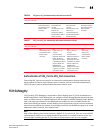
Fabric OS Administrator’s Guide 317
53-1001763-02
E_Port authentication between Fabric OS and M-EOS switches
14
Authentication of VE_Port-to-VE_Port connections
Although running authentication for VE_Ports works the same as for E_Ports, for VE_Ports, both
sides of the connection are on the Fabric OS switches. Table 64 shows the switch authentication
policy for VE_Port-to-VE_Port connections when all the secrets are correct. Note that there is no
*Yes in the table indicating one-way authentication. This is because Fabric OS switches always
perform authentication even when in Passive mode. Table 64 shows the switch authentication
policy for a VE_Port connected to another VE_Port when the secrets are not known. In this case,
two-way authentication by the Fabric OS switches means that no authenticated connections are
going to be made.
TABLE 64 VE_Port-to-VE_Port authentication policy with correct switch secret
Fabric OS
switch
VE_ to VE_Port
Passive Active On Off
Passive Yes
Connected without any
authentication (Fabric
builds normally).
Yes!
Connected with
two-way
authentication; both
sides of the
connection perform
Authentication
(Fabric builds
normally).
Yes!
Connected with
two-way
authentication;
both sides of the
connection
perform
Authentication
(Fabric builds
normally).
Yes
Connected without any
authentication (Fabric
builds normally).
Active Yes!
Connected with two-way
authentication; both
sides of the connection
perform authentication
(Fabric builds normally).
Yes!
Connected with
two-way
authentication; both
sides of the
connection perform
authentication
(Fabric builds
normally).
Yes!
Connected with
two-way
authentication;
both sides of the
connection
perform
authentication
(Fabric builds
normally).
No
E_Port does not connect
(Authentication Rejected).
When the Fabric OS switch
generates the reject, it
disables the Fabric OS
port. When the M-EOS
switch generates the
reject, it goes to an invalid
attachment state.


















